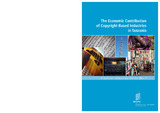The Economic Contribution of Copyright-Based Industries in Tanzania

Date
2012Author
Nyariki, Dickson
Otieno, Caleb
Sinare, Doreen
Lema, Alinda
Language
enMetadata
Show full item recordAbstract
Copyright and related rights industries, also called copyright-based industries, are a component of what
are usually referred to as the creative industries. These are economic activities based on the creation,
management, use of and trade in original creations expressed in tangible form. They are intangible assets
made up of a bundle of exclusive economic rights to do certain acts with original works or other copyright
subject-matter. There has recently been increased interest in copyright due to the growing recognition of
its role, which goes beyond the view that it is simply focused on providing legal protection and a workinenvironment conducive to creative activity. This has been demonstrated by the number of studies conducted
to quantify the contribution of copyright-based industries in several countries in Europe, America, Asia and
Africa. Copyright involves a signifiant economic impact at both the business and national levels; enhanced
understanding of the economic contribution of copyright would enable governments to have an increased
focus on mainstreaming copyright-based industries in their development policies.
The main objective of this study was to quantify the economic contribution of copyright-based industries in
Tanzania by estimating their value-added contribution to GDP, share of national employment, and revenue
generated from foreign trade. In addition, the study aimed at providing material to assist in the formulation
of adequately informed policies in order to improve the operation of the creative sector in the country. The
WIPO Guide (2003) was used as a methodological basis for this research. The Guide classifis the copyrightbased industries into core, interdependent, partial, and non-dedicated support industries (NDSIs). The study
depended mainly on secondary data covering the years 2006-07 to 2009-10. The main sources of these data
were government departments and other related organizations, including the National Bureau of Statistics
(NBS), Tanzania Revenue Authority (TRA), Business Registration and Licensing Agency (BRELA) and the
Copyright Society of Tanzania (COSOTA), which is the only collective management organization (CMO) that
also serves as a copyright offie.
This study has generally demonstrated that copyright-based industries in Tanzania make a signifiant
contribution to the national economy. The copyright-based industries generated in 2007-2010 an addedvalue of between TZS 391.635 and TZS 680.990 billion respectively, translating to a contribution of 3-4.6%
to the gross domestic product (GDP). They also generated TZS 38.930 billion and TZS 83.686 billion as
income to employees, or a proportion of 2.8 and 5.2% of the total national economic value, and employed
28,202 and 44,331 people, or 4.5 and 5.7% of the total national workforce. In terms of GDP contribution,
the copyright-based industries generally performed better than hotels and restaurants, and the mining and
quarrying sectors. In fact, the core copyright industries alone contributed more to the national economy
than the mining and quarrying sectors in 2009 and 2010 (3.2% and 2.8% respectively), underscoring the
important role these industries play in Tanzania.
The results of this Tanzania study were generally consistent with similar studies in Kenya and most other
countries. Tanzania’s core copyright industries made a contribution of 3.2% of the GDP in 2009. This
performance was better than that in 11 studies of countries over various years – including Croatia (3%),
Singapore (2.9%), Latvia (2.9%), Lebanon (2.5%), the Russian Federation (2.4%), and Kenya (2.3%).
Tanzania also performed well with regard to employment contribution by the core copyright industries,
recording a value of 2.6%, and placing the country above seven other countries – Romania (2.4%), Bulgaria
(2.3%), Lebanon (2.1%), Jamaica (1.8%), Colombia (1.7%), Kenya (1.2.) and Ukraine (1.2%).
Among the disaggregated copyright industries, the partial industries contributed a proportionally greater
value of exports over imports compared with the total national exports and imports in 2009, which were
3.9% and 0.8% respectively. For the rest of the copyright industries, however, this result was the reverse.
Furthermore, the copyright-based industries had a relatively high import component, predominantly within
the interdependent category, resulting in a reduction in value-added fiures. This last result is similar to that
of Kenya, implying that the structures of external trade in the two countries are somewhat comparable.
The current study was commissioned by WIPO upon request from the Government of Tanzania, in light of the
increasing importance of copyright-based goods and services to the economy. It is expected that the results
of the study will serve as an important input in prompting the government to act by strengthening policies
that will go a long way to support the growth and development of the copyright-based sectors in the country
Citation
Nyariki, D. M., Otieno, C., Sinare, D., & Lema, A. (2012). The Economic Contribution of Copyright-Based Industries in Tanzania.Publisher
University of Nairobi
Collections
- Reports [373]
